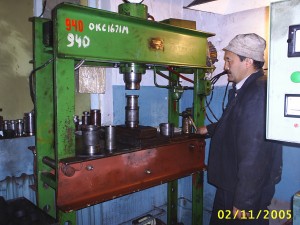ASTANA – Astana’s Technology Commercialisation Centre (TCC) announced its latest round of grant winners, which include projects Lead Expert Erik Azulay described as world class, at a Nov. 28 seminar for new grant winners at Astana’s Beijing Palace Hotel.
 The winners include projects in fields from medicine and veterinary science to agriculture, information technology and more. At the seminar and awarding ceremony, Azulay said that the level of competition for the latest round of grants had shot up, making the selection process much more difficult. The proposals the selection team reviewed were equal to the best proposals being received at Moscow State University, Azulay told the grant winners, and encouraged projects that were not funded in this round to try again.
The winners include projects in fields from medicine and veterinary science to agriculture, information technology and more. At the seminar and awarding ceremony, Azulay said that the level of competition for the latest round of grants had shot up, making the selection process much more difficult. The proposals the selection team reviewed were equal to the best proposals being received at Moscow State University, Azulay told the grant winners, and encouraged projects that were not funded in this round to try again.
The 17 projects were awarded either proof of concept grants of up to 22 million tenge (US$121,126) or industrial prototype grants of up to 74 million tenge (US$407,592), both of which are funded by the government of Kazakhstan and the World Bank. The winning projects apply to fields from agriculture to veterinary science to information technologies and the energy sector. Several new projects, including one on storage using zinc and nickel oxide batteries, have global potential, Azulay said.
“The level of the projects was much higher than last time,” Azulay said at the seminar. “And geographically … they were much more spread out. Before, it was basically Astana, Almaty and Karaganda. This time it’s much more spread out, which is a good thing – it means our outreach, our seminars [are working] and people are more interested – and that’s good for the country, that we’re seeing things spread out more,” he said. In addition to Astana, Almaty and Karaganda, winning projects in this round came from Pavlodar, Petropavlosk, Taraz and Ust-Kamenogorsk.
Project winners seem to span a range of ages, something Azulay says the TCC is pleased with. “All the IT projects are all young go-getters, the new generation. For the hard sciences, these are mostly experienced older guys, some of them even from the Soviet generation. For us, it’s good to see the mixing of two generations, and we think it’s actually harder for the older generation to get out there and get into commercialisation, which was not only discouraged but illegal back in the old days. So to see that kind of change is good.”
Alexander Lee and Ivan Ivashuk of Karaganda won a grant for their project, Collaboration of Science and Technology, to use an innovative glueing method to convert coal dust, a waste product, into coke briquettes that can be used for high temperature heating in that region’s important metallurgical industry.
“The grant financing will be used for a pilot plant, first of all,” Ivashuk said. “Our aim by the end of this year is to fulfil 30 percent of the demand [for briquettes] for one company in Karaganda, one of the biggest metallurgical companies there. After one and a half or two years, we will be able to meet the entire demand for this company.”
The two heard about TCC’s grant programme through one of the organisation’s outreach seminars.
Another industrial prototype project will support the initial production of components for compact X-ray machines. Alexei Mametov, project leader, said that his team was currently collaborating with a manufacturer in Moscow, but that they hope to bring their entire production cycle to Kazakhstan.
“The grant will help us to work on technological processes and prepare all the documentation and infrastructure, for the future,” he said. Demand for the product is high, he added, and once he can prove that it can be produced reliably, he’s confident there will be many takers. As for moving production to Kazakhstan, he said, “Our team is from Kazakhstan and we want to implement our idea here and create them in Kazakhstan. We love our country and we want to help it progress.”
